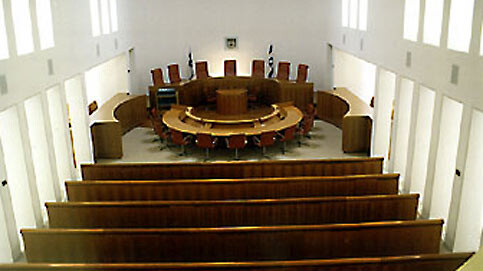The Electronic Intifada 16 June 2006

Courtroom in Israel’s High Court (The Judicial Authority)
A family is an entire world. But instead of making every effort to guard the right to a family life, the High Court of Justice decision regarding the petitions against the Citizenship Law confirmed the invasion, rending and destruction of this personal world by the state.
This is a generalization, since in Israel of 2006 the right to a family life is recognized as a constitutional right, which is entitled to protection from invasive harm on the part of the state. But that is not the case when it comes to Israel’s Arab citizens who have chosen to marry partners from among their people who live under Israeli occupation. At least not according to the opinion of the majority in the High Court, which was written by the outgoing deputy president of the Supreme Court, Mishael Cheshin.
Cheshin’s opinion states that it is legitimate to prevent the reunification of Arab families, for demographic considerations of maintaining the Jewish majority. That is why its implications go beyond the issue of preventing family unification for security reasons.
The security argument raised by the state in the High Court deliberations was not supported by the statistics, in addition to the fact that it is clear to most of the public that this is not the real reason.
The citizens of the state do not have a constitutional right to dictate to the state who can be brought into it as partners, and to change the status quo that prevails in the society, wrote Cheshin. It is hard to believe he failed to see that the unification of Jews with their partners is guaranteed by the Law of Return. That is why Cheshin’s words should be read as follows: Arab citizens have no right to a family life in their homeland, if this means granting legal status to their partners in Israel. The reason is that this changes the numerical ratio between Arabs and Jews, thus changing the status quo in Israel.
In other words, the constitutional status quo in Israel not only guarantees the preservation of the Jewish majority by means of the Law of Return, which has been interpreted by the High Court as identical in status to a Basic Law, but also grants legitimacy to restricting the right of members of the minority group to have a family life.
Granting a collective right to a national group and denying it to a native-born national group is not sufficient, according to Cheshin. Even when the individual rights of members of the minority group clash with the collective rights of the majority, the latter take preference.
In every constitutional democratic regime, the constitution and the rights anchored in it are supposed to apply to all the citizens equally, regardless of origin, religion or nationality. In addition, there is a recognition that the rights anchored in the constitution are not absolute, and that a balance can be established among them and they can be undermined to a certain degree, in order to promote the general good and the social order.
But Cheshin’s opinion does not establish a balance among rights reserved for all, in an egalitarian manner. On the contrary. It anchors a utilitarian approach, by which the rights of some of the citizens are sacrificed on the altar of the “general” good. The line that separates the group that is harmed by this approach from the group that benefits from it is national origin.
The opinion reflects an approach that links utilitarianism and chauvinism as a basis for the constitutional regime. According to this approach, the individual rights of citizens who are not among the majority group are protected only as long as they do not harm the rights of the Jewish collective.
This leads to the creation of a formula in which a structural clash between democratic civil rights and “Jewish” rights serves as a basis for the constitutional regime, instead of a civil partnership alone.
By rejecting the petitions against the Citizenship Law, the High Court failed in its role as a defender of individual rights and minority rights. But the opinion of the deputy president is even more disturbing, because underlying it is an approach that subverts the basis of the constitutional democratic regime. It is a good thing that most of the justices did not agree with all its parts.
Azem Bishara is an attorney in the Association for Civil Rights in Israel (ACRI). This article first appeared in Ha’aretz and reprinted on EI with permission.


